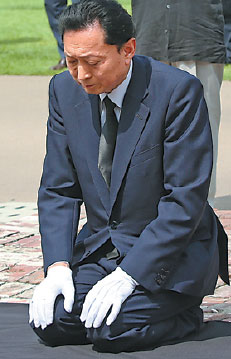Former Japanese PM urges Abe to express remorse
Updated: 2015-08-14 08:05
By Zhang Yunbi(China Daily USA)
|
|||||||||
Comments to become 'touchstone of relations'
A former Japanese leader has called on Prime Minister Shinzo Abe to make a heartfelt apology for the nation's wartime atrocities.
Yukio Hatoyama, who served as Japan's prime minister from 2009 to 2010, bowed his head 11 times in silent prayer and knelt in front of a memorial on Wednesday at Seodaemun Prison in Seoul, where a number of Korean independence fighters were imprisoned and tortured, Xinhua News Agency reported.
Abe should make a public apology "from the heart", Yonhap news agency quoted Hatoyama as saying, as the prime minister is set to issue a statement on Friday to mark the 70th anniversary of the end of World War II.
Japan's Kyodo News agency quoted unnamed sources with the Japanese government as saying on Thursday that Abe will host a Cabinet meeting to get his Abe Statement approved.
At 6 pm local time, Abe is scheduled to hold a news conference at the prime minister's residence. Kyodo said the statement is expected to contain expressions such as "apology" and "aggression".
UN Secretary-General Ban Ki-moon has called on Japan to reflect on its war history in order to move forward, Ban's spokesman Stephane Dujarric told a briefing at UN headquarters on Wednesday.
South Korean Foreign Minister Yun Byungse said on Wednesday that Abe's statement "will be a touchstone" for the improvement of relations.
Zhou Yongsheng, a professor on Japan studies at China Foreign Affairs University, said that Abe, in the process of drafting the statement, will have attempted to avoid infuriating both the left-wing and right-wing voices in the country by striking a seemingly balanced gesture between the pacifist and historical revisionist positions.
Wang Chi, a professor of history at George town University and president of the US-China Policy Foundation, said Abe should admit the aggression.
"I witnessed the cruelty of war. I watched Japanese soldiers march into Beijing when the Marco Polo Bridge Incident happened in 1937. And I was in Beijing when people jumped for joy to celebrate the end of the war in August 1945," Wang recalled.
Shihoko Goto, senior associate for Northeast Asia at the Wilson Center in Washington, said: "Japan needs to be aware of its aggressive occupation of Korea and China, and its brutality in Southeast Asia."
"Japan can be a stronger regional leader by articulating its history as a whole, both as a victim and as an aggressor," Goto said in a video on the Wilson Center's website.
Liu Jingyang and Xinhua contributed to this story.
zhangyunbi@chinadaily.com.cn
|
Former Japanese prime minister Yukio Hatoyama kneels in front of a memorial in Seoul on Wednesday. YNA |
(China Daily USA 08/14/2015 page1)
- IS likely uses mustard agent in Iraq attack
- Fidel Castro marks 89th birthday with surprise visit
- Switzerland begins public consultations on joining China-led AIIB
- Malaysia seeks increased trade ties with China
- China salutes veterans of anti-Japanese aggression war
- 5 Japanese ex-PMs show concerns over security bills
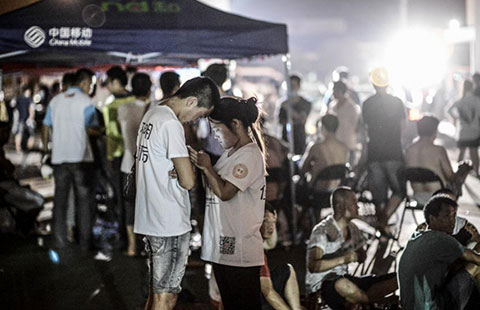
 School turns into place of shelter in Tianjin
School turns into place of shelter in Tianjin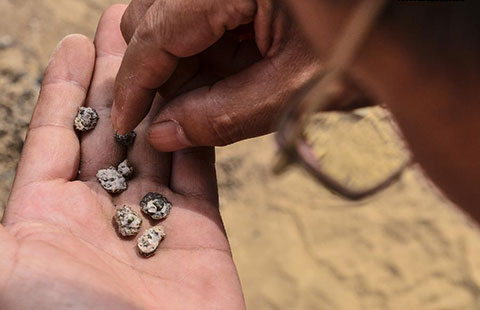
 Earliest site of coal fuel found in Xinjiang
Earliest site of coal fuel found in Xinjiang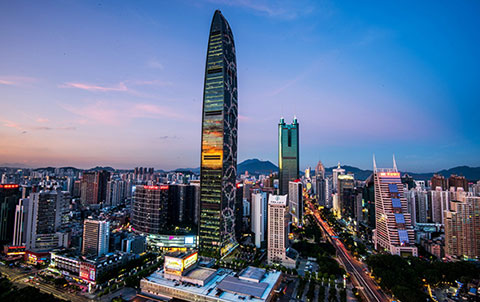
 Top 10 Chinese cities with highest property prices
Top 10 Chinese cities with highest property prices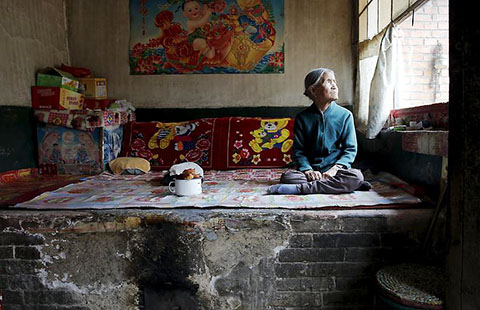
 Comfort women: Scars have not been healed
Comfort women: Scars have not been healed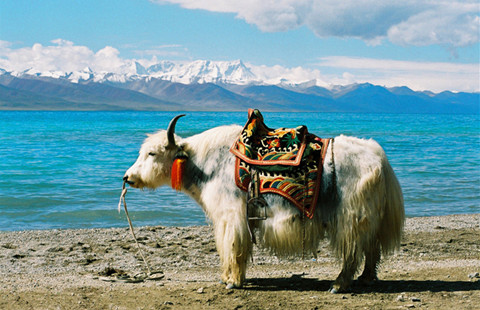
 Top 10 places to visit in Tibet
Top 10 places to visit in Tibet
 8 groups yuan depreciation will impact most
8 groups yuan depreciation will impact most-
 Historic kiss on grand scale
Historic kiss on grand scale 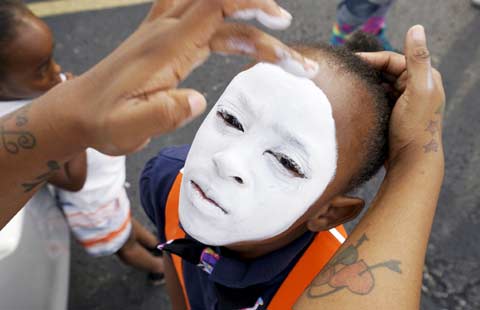
 The world in photos: Aug 3-9
The world in photos: Aug 3-9
Most Viewed
Editor's Picks

|

|

|

|

|

|
Today's Top News
China investigates Tianjin blasts, experts focus on chemicals
PBOC promises effective steps for yuan stability
US oil slides to six-and-a-half year low under $42 as stocks build
US believes IS likely uses mustard agent in Iraq attack
12 firefighters among 44 killed in Tianjin explosions
Hacking blame a US power play: experts
Seattle's tallest building sold
Alibaba falls behind Amazon
US Weekly

|

|
